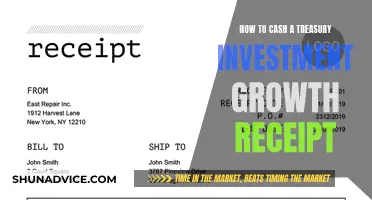
With inflation at a 40-year high, it's important to consider the best places to invest your cash. While savings rates are still low, there are other options to consider, such as high-yield savings accounts, money market funds, certificates of deposit (CDs), government bonds, corporate bonds, and stocks.
High-yield savings accounts and money market funds are good options for short-term savings or emergency funds, while CDs, government bonds, and corporate bonds are better for those who want to safely grow their money over a fixed period. Stocks are a good option for investors with a well-diversified portfolio who can tolerate higher levels of risk.
It's also important to have a mix of investments and savings to assuage any fears around affording large upcoming expenses without having to withdraw money from the market.
| Characteristics | Values |
|---|---|
| Risk | Low risk, but with negative inflation-adjusted returns |
| Returns | Negative after inflation |
| Liquidity | High |
| Accessibility | Immediate |
| Insurance | FDIC-insured up to $250,000 |
| Interest rates | High |
| Investment timeline | Short-term |
What You'll Learn

High-yield savings accounts
LendingClub Bank
LendingClub Bank offers a top-tier savings APY on its LevelUp account. There is no minimum opening deposit requirement and no monthly service fees, making it an accessible option for all savers. To earn the LevelUp savings rate, you need to deposit at least $250 each month into your account. If you miss a monthly cycle, you will earn a lower, but still high-yielding standard rate.
BrioDirect
BrioDirect offers a competitive yield on its High-Yield Savings account. You need to keep at least $25 in the account to earn the APY and at least $5,000 to open this account. Your account may be closed if it doesn’t have money in it for 21 or more days.
EverBank
The EverBank Performance Savings account earns more than the national average APY. There’s no minimum deposit required to open the account and no monthly maintenance fee. Some savings accounts from other banks offer slightly higher yields.
Bread Savings
Bread Savings is an online bank that offers a high-yield savings account and five terms of CDs. Bread Savings requires at least $100 to open this account. With just $100 needed to open an account and no monthly maintenance fees, savers of all types may find it to be an appealing option. A paper statement will cost you $5 per request at Bread Savings, and the bank charges $25 to send a wire transfer.
CIT Bank
CIT Bank is known for offering multiple savings accounts. CIT Bank’s Platinum Savings account earns the highest yield on balances of $5,000 or more, while the Savings Connect account can be opened with just $100. These accounts don't charge a monthly service fee. CIT Bank also has most of the other bank accounts a person could need, including a checking account, a money market account, and CDs.
Bask Bank
Bask Bank is known for its high-yielding Bask Interest Savings account. It’s also known for a unique account, the Bask Mileage Savings account, where you can earn American Airlines miles. Bask Bank, a division of Texas Capital Bank, made its debut in early 2020 with its Mileage Savings Account. In February 2022, Bask introduced its Interest Savings Account, which offers a very competitive yield and doesn’t require a minimum opening deposit.
Popular Direct
Popular Direct is known for offering competitive yields. But those competitive yields have $100 minimum opening deposit requirements with the Popular Direct High-Rise Savings account. The account also has a $25 fee for closing it within your first 180 days, so definitely make sure you’re going to keep this account for at least that amount of time. Popular Direct has been around since 2016. It offers a savings account and eight terms of CDs. The CDs have terms ranging from three months to five years.
CIBC Bank USA
CIBC Bank USA is currently known for offering a competitive yield on its CIBC Agility Online Savings Account, which charges no monthly service fee. The bank also is known for offering CDs that have a slightly higher yield. The CIBC Bank USA Agility Online Savings Account offers a top-tier yield, and it’s a good option for some savers who have at least $1,000 to initially deposit. The Agility Online Savings Account doesn’t have a monthly service fee, but CIBC’s Agility Online Savings Account requires at least $1,000 as an opening deposit. This is a much higher requirement than some other online banks.
TAB Bank
TAB Bank is known for offering competitive yields. It’s also known for its unique checking account for truck drivers. TAB Bank’s High Yield Savings Account doesn’t require a minimum opening deposit and doesn’t have a monthly maintenance fee. TAB Bank pays the same yield on any balance. Paper statements cost $5 for TAB Bank’s High Yield Savings Account, and outgoing wire transfers cost $30.
UFB Direct
UFB Direct is known for its high-yield savings account and money market account. Both the UFB Portfolio Savings account and UFB Portfolio Money Market account earn very competitive yields. One of their differences is that the UFB Portfolio Savings account, which has ATM access, doesn’t charge a monthly service fee. The UFB Portfolio Money Market account charges a $10 monthly maintenance fee if you don’t keep at least $5,000 in the account.
Cashing Out Putnam Investments: A Step-by-Step Guide
You may want to see also

Money market funds
- Cash-equivalent securities
- High-credit-rating, debt-based securities with short-term maturity (e.g. US Treasuries)
- Bankers' Acceptances (BA)
- Certificates of Deposit (CDs)
- Commercial paper
- Repurchase agreements (Repo)
However, money market funds are sensitive to interest rate fluctuations and monetary policy changes. They also have low returns compared to stocks and corporate debt issues, and they lack FDIC insurance.
- Vanguard Federal Money Market Fund (VMFXX)
- Schwab Value Advantage Money Fund (SWVXX)
- JPMorgan Prime Money Market Fund (VMVXX)
- Invesco Government Money Market Fund (INAXX)
- Fidelity Money Market Fund (SPRXX)
- Vanguard Municipal Money Market Fund (VMSXX)
Cashing Out Refinance: A Smart Investment Move?
You may want to see also

Certificates of deposit (CDs)
CDs are best for individuals looking for a guaranteed rate of return that is typically higher than a savings account. In exchange for a higher rate, funds are tied up for a set period, and early withdrawal penalties may apply.
CDs are one of the safest savings vehicles as your money is federally insured. They are also a good investment because your money grows without the risk of your rate dropping (which can happen with a high-yield savings account), and you are guaranteed a return without worrying about stock market volatility.
When choosing a CD, first focus on how long you want to keep your money locked up. Pick a CD based on that length of time, and the rate will follow. Shorter CD terms, such as three to six-month CDs, are a good choice for beginners who want to save (and grow) their money for a short-term goal, such as a vacation.
When comparing CDs, make sure you are comparing the same term, like a one-year CD to another one-year CD at a different bank. With CDs, the interest rate is important, as well as considering what the minimum deposit is and any early withdrawal penalties and fees.
The pros of CDs include fixed interest rates (a good thing when rates are high), the fact that you can't touch CD funds until the term is up (a good thing so you're not tempted to spend), and different CD types allow you to have options, such as bump-up CDs (for raising your rate), no-penalty CDs (for easy withdrawals), add-on CDs (for making additional contributions), jumbo CDs (for large deposits) and IRA CDs (for retirement).
The cons of CDs include fixed interest rates (a bad thing when rates are low or if rates go up while you're in the middle of a CD term), the fact that you can't touch CD funds until the term is up (a bad thing if you need that money), early withdrawal penalty fees, the fact that you can generally only deposit money into a CD once at the beginning of the term and can't make additional contributions, and that there is sometimes a minimum deposit requirement, usually $500 and up.
Understanding Non-Cash Investment Gains: What You Need to Know
You may want to see also

Government bonds
When considering investing in government bonds, it is essential to understand the current market conditions and interest rate environment. In recent years, the Federal Reserve's actions to tame inflation have resulted in interest rate hikes, affecting bond prices. However, as of September 2024, the Fed has started cutting interest rates, making it a good time to invest in longer-term bonds to lock in higher yields.
One important consideration when investing in government bonds is the duration or sensitivity of the bonds to interest rate changes. Extending the duration of your bond investments before a period of declining interest rates can result in higher total returns. Additionally, investing in a diversified portfolio of high-quality government bonds can further mitigate risks.
In summary, government bonds offer a relatively safe and stable investment option with predictable returns. They are an excellent tool for diversifying your portfolio and reducing overall risk. By understanding the market conditions and considering the duration of your investments, you can take advantage of the current interest rate environment and potentially capture higher yields.
Liquidating US Investments: A Country's Cash Out Strategy
You may want to see also

Corporate bonds
There are a few different types of corporate bonds:
- Fixed-rate bonds, which have a predetermined interest rate.
- Floating-rate bonds, which have variable interest rates that change based on benchmarks such as the U.S. Treasury rate.
- Zero-coupon bonds, which don't come with interest payments. Instead, you pay below face value and receive the full value at maturity.
- Convertible bonds, which give companies the flexibility to pay investors with common stock instead of cash when a bond matures.
When investing in corporate bonds, it's important to consider the credit rating of the company. The higher the credit rating, the lower the risk of default. Bonds with a credit rating of AAA or Aaa are considered the safest, while those with a rating of BB or Ba or below are considered "junk bonds", with a higher risk of default.
Another thing to keep in mind is that bond prices and interest rates are inversely related. When interest rates rise, bond prices fall, and vice versa. So if you're investing in corporate bonds, it's important to keep an eye on interest rates and the overall economic environment.
Overall, corporate bonds can be a good investment, especially if you're looking for a lower-risk option with regular cash payouts. They can also add diversification to your portfolio, especially if you have a stock-heavy portfolio. However, it's important to remember that they may not offer the same long-term returns as stocks and that there is still some risk involved with corporate bonds.
Maximizing Cash Balance Plans: Strategies for Savvy Investors
You may want to see also
Frequently asked questions
Saving cash helps you achieve short-term financial goals and is a low-risk option. It's also a good idea to have an emergency fund of three to six months' worth of living expenses.
The inflation-adjusted returns on savings are negative, so your cash savings will lose value over time. Savings accounts also have lower returns than investing.
Investing has higher returns than simply saving cash and is a good way to build wealth over time.
A:







